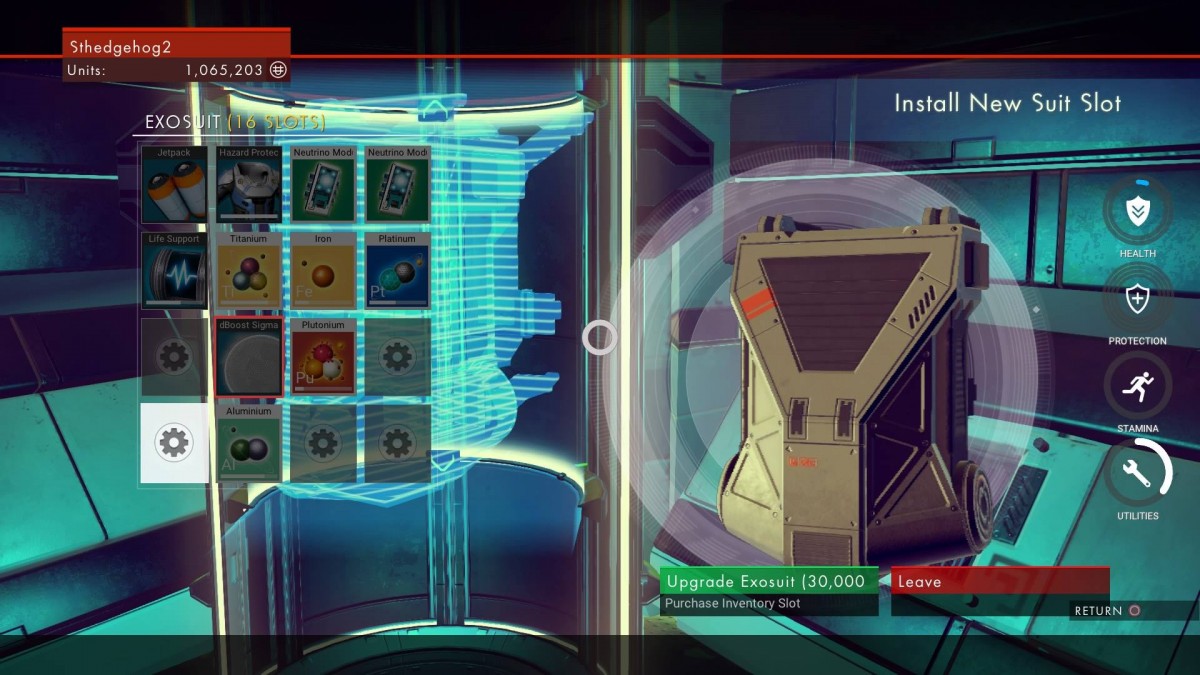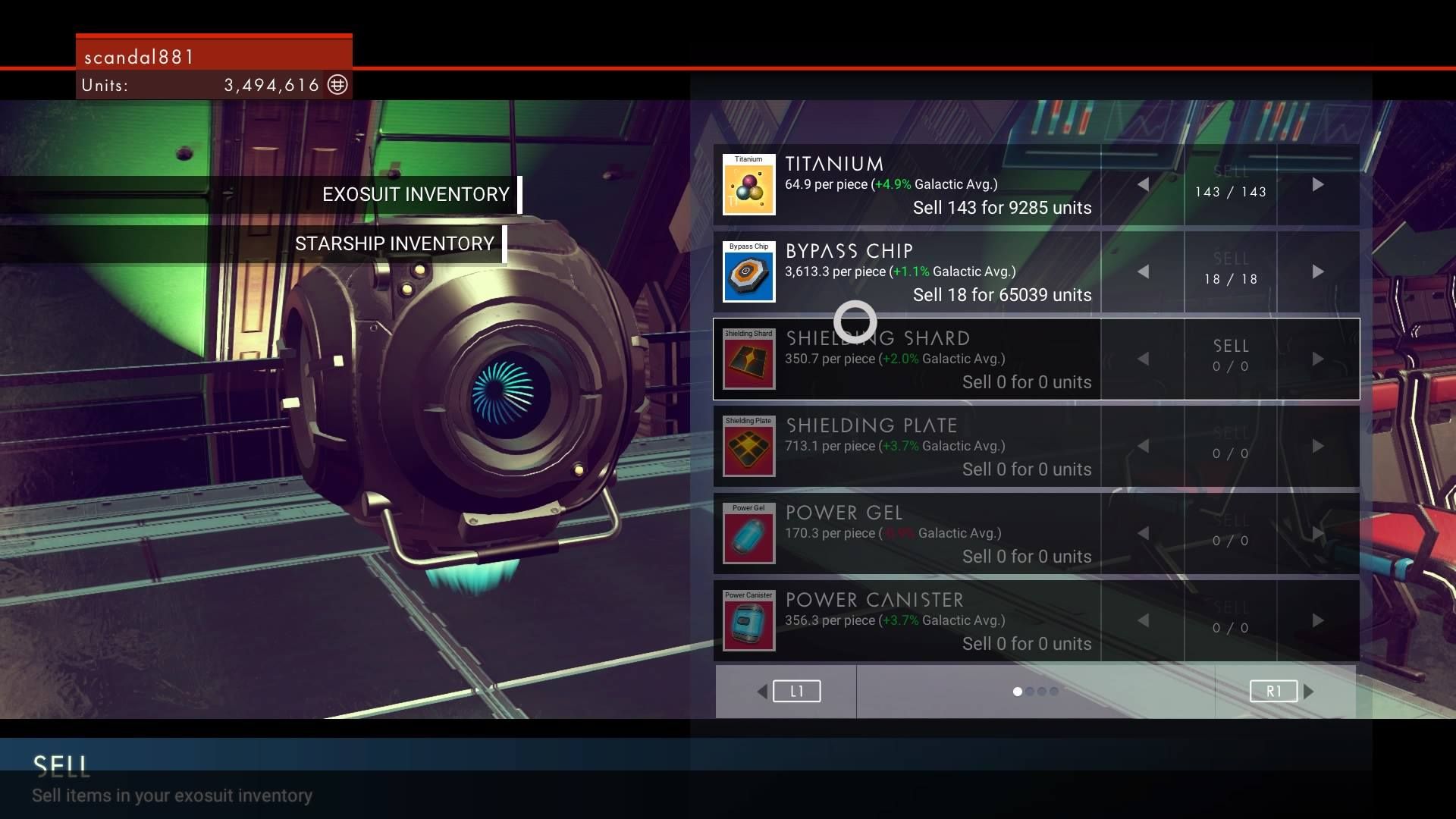Now that PC players around the world are dropping into the No Man’s Sky universe, everyone is exploring planets, cataloging wildlife, and gathering lots of resources (while hopefully staying on the friendly side of the Sentinels). However, it won’t take much mining before you start to find yourself faced with the dreaded “Inventory Full” message.
Running out of inventory space can be a frustrating experience. Just because no one in space can hear you scream doesn’t mean you shouldn’t be yelling about never having enough space to loot containers or mine resources you so desperately need. In this article, we’ve put together a handful of different helpful tips to give you some breathing room, all of which should be useful to novice explorers as they get started in No Man’s Sky.

1. Upgrade Your Exosuit
The simplest solution to not having enough space is to simply get more space. Expanding your exosuit is more easily said than done, but it’s possible to accomplish fairly quickly. Basic exosuit upgrades are most commonly found inside Drop Pods.
The simplest way to find these Drop Pods is to keep an eye out for Signal Scanners, which appear as square-ish machines on the ground emitting tall beams of orange light. You can activate them using a Bypass Chip (a basic consumable product crafted with 10x Iron and 10x Plutonium) which allows you to use the Signal Scanner to reveal nearby points of interest. Select “Shelter” from the list, and a nearby Shelter will appear on your HUD.
Travel there, using your ship if necessary, and hope you can find one of these useful exosuit upgrades in the Drop Pod there. However, even with a couple upgrades, you still won’t have infinite room in your suit!
2. Teleport Items to Your Starship
One of the easiest ways to free up inventory space in your exosuit is to transfer them to your starship. Generally, your starship is going to have more space than your suit, and it’s a handy place to stash materials like Plutonium that are primarily used by your ship’s systems.
Don’t forget that you can send materials to your ship no matter where it is in relationship to you. The only downside is that it’s a one-way street, so anything transferred to your ship is stuck there until you physically go back to it to retrieve it. Though, you’re also limited by the number of inventory spaces in your ship.
3. Upgrade Your Starship
While this seems like an appealing option at first, upgrading your starship can be difficult at the start of the game because it generally costs a very large number of units, the currency used in No Man’s Sky. To give you an idea, you’re looking at a minimum of about 1,000,000 units for any new starship.
The good news, if you have the cash, is that all you’ll need to do is visit a space station and chat with the procedurally generated pilots in the landing bay. It seems like all of these NPC pilots are happy to sell their ships, so you can look for one that suits your needs and has plenty of cargo space. Trader vessels generally will have the largest number of cargo spaces, so if you’re really looking to stock up, keep an eye out for one of these vessels in particular.
Just don’t forget to transfer any items you want to keep to the cargo bay of your new ship before finalizing your purchase, otherwise the NPC will assume the items in your ship are part of the sale.

4. Sell Items and Resources
While many crafting and survival games have mechanics that encourage players to mine and store lots of resources for future use, No Man’s Sky is not one of them. You’ll discover early on that some resources like Iron and Carbon are common enough that you really only need to grab them when you’re actually in immediate need (such as re-charging your multi-tool or crafting a bypass chip). Some resources are also fairly valuable and can be easily sold to generate a steady stream of units to fuel other aspects of your journey.
You can sell resources and items in a couple of different ways. The first is while visiting space stations, by chatting with visiting NPC pilots. These NPCs will often buy your green-colored trade goods as well, but check their offered prices against the galactic average so you don’t get ripped off!
If you find an outpost on a planet, there is typically a Galactic Trade Terminal located inside. These terminals allow you to sell resources from your exosuit inventory (and your ship, if it’s very close by). This can be very lucrative if there are valuable resources nearby because you can fill your inventory and then sell it off, repeating the process until you either have enough credits, run out of resources to mine, or just get bored of the process.
Depending on the planets you discover, Gold, Plutonium, and Emeril can be plentiful enough to raise a lot of credits in short order. Regardless, selling anything you don’t need can be an easy way to free up space without feeling like you’ve totally wasted something, unlike our next and final suggestion.
5. Dispose of Items You Don’t Need
While it can feel wasteful, remember that with a click of a button you can simply destroy any resource or item you don’t need. Sure, you might have a need for that Carite Sheet down the road, is it really worth taking up one of your prized inventory spaces for?
Especially in the early hours of the game, you’re going to need to make decisions about what’s worth keeping and what you’re OK with giving up. Chances are you won’t find anything so rare or valuable that you can’t replace it with a little bit more exploring, and sometimes you need more inventory slots right away for more pressing needs.
Have any great inventory management or expansion ideas to share? Let us know in the comments below or on our Facebook and Twitter pages!
For more information about No Man’s Sky, check out the other articles below or visit the No Man’s Sky Wiki on Gamepedia.

Benjamin Tarsa
Benjamin manages all of the non-wiki content on Gamepedia as well as taking care of community-related concerns and relationships with indie partners. In his spare time he is an avid reader and gamer, and has freakishly flexible thumbs.


